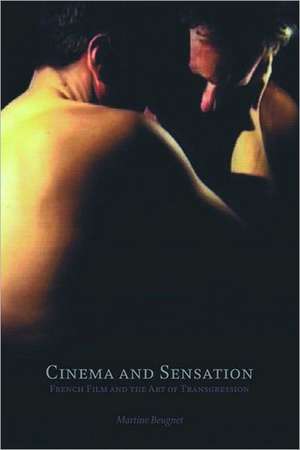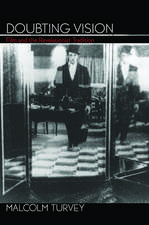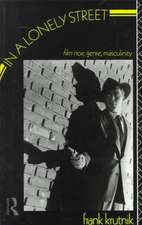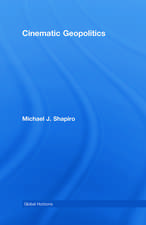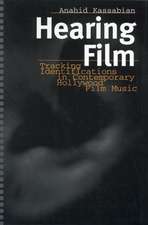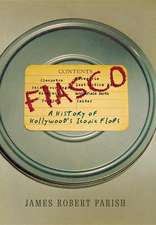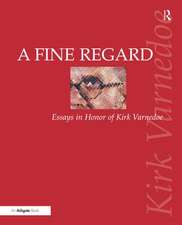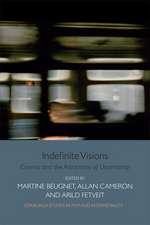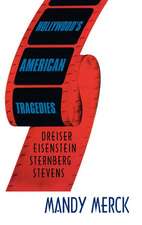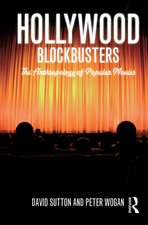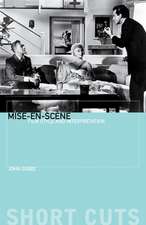Cinema and Sensation
Autor Martine Beugneten Limba Engleză Paperback – 16 feb 2012 – vârsta de la 22 ani
Preț: 190.50 lei
Preț vechi: 213.44 lei
-11% Nou
Puncte Express: 286
Preț estimativ în valută:
36.46€ • 39.62$ • 30.65£
36.46€ • 39.62$ • 30.65£
Carte disponibilă
Livrare economică 31 martie-14 aprilie
Preluare comenzi: 021 569.72.76
Specificații
ISBN-13: 9780748649365
ISBN-10: 0748649360
Pagini: 192
Dimensiuni: 155 x 231 x 20 mm
Greutate: 0.3 kg
Editura: EDINBURGH UNIVERSITY PRESS
ISBN-10: 0748649360
Pagini: 192
Dimensiuni: 155 x 231 x 20 mm
Greutate: 0.3 kg
Editura: EDINBURGH UNIVERSITY PRESS
Notă biografică
Cuprins
1. Beginnings; 2. A 'Third Path'; 3. The Aesthetics of Sensation; 4. Film Bodies (Becomings and Embodiment); Epilogue.
Recenzii
Beugnet's book offers a compelling example of how film criticism can operate at the junction between perception and understanding, between embodied response and critical reflection... In its articulation of connections between sensation and transgression, and in its linking of film's affective powers to the urgency of political contexts, Cinema and Sensation presents a rich and timely assessment of contemporary French film's engagement with the senses. -- Laura McMahon, Girton College, Cambridge The Senses and Society Cinema and Sensation persuasively argues that the radical styles of recent French films merit new theories and approaches. -- Hunter Vaughan Film Quarterly Cinema and Sensation achieves a seamless intermingling of theoretical enquiry and film analysis, allowing film and theory to shape and inflect each other... Beugnet is an unflinching viewer, and her boldness, combined with her evident pleasure in the works she discusses, makes for much of the exhilaration of the volume. Cinema and Sensation offers new and elastic contact with French cinema, as it also awakens new thought through the senses. -- Emma Wilson Screen This exciting work by film scholar Martine Beugnet makes an important contribution to contemporary debates on the materiality and affective potential of cinema. -- Carrie Tarr, Kingston University Modern and Contemporary France It is a testament to her incisive and highly eloquent prose that her core argument is never obscured by dense theorising or hijacked by all-too obvious straining for academic profundity... those who still remain inured to (or unconvinced by) Deluzean film analysis would do well to dip into this book, so lucidly does it present complex arguments. -- Ben McCann, University of Adelaide Screening the Past Beugnet's book offers a compelling example of how film criticism can operate at the junction between perception and understanding, between embodied response and critical reflection... In its articulation of connections between sensation and transgression, and in its linking of film's affective powers to the urgency of political contexts, Cinema and Sensation presents a rich and timely assessment of contemporary French film's engagement with the senses. Cinema and Sensation persuasively argues that the radical styles of recent French films merit new theories and approaches. Cinema and Sensation achieves a seamless intermingling of theoretical enquiry and film analysis, allowing film and theory to shape and inflect each other... Beugnet is an unflinching viewer, and her boldness, combined with her evident pleasure in the works she discusses, makes for much of the exhilaration of the volume. Cinema and Sensation offers new and elastic contact with French cinema, as it also awakens new thought through the senses. This exciting work by film scholar Martine Beugnet makes an important contribution to contemporary debates on the materiality and affective potential of cinema. It is a testament to her incisive and highly eloquent prose that her core argument is never obscured by dense theorising or hijacked by all-too obvious straining for academic profundity... those who still remain inured to (or unconvinced by) Deluzean film analysis would do well to dip into this book, so lucidly does it present complex arguments.
